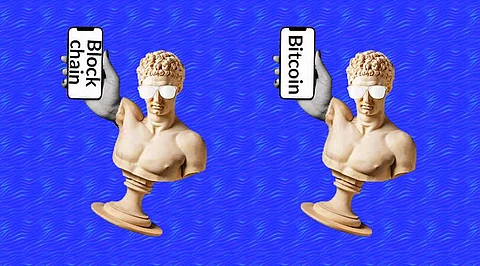

In the world of cryptocurrencies and blockchain technology, it's common for the terms "blockchain" and "Bitcoin" to be used interchangeably, but they are not the same thing. While both are significant innovations in the world of finance and technology, they serve different purposes and have distinct characteristics. This article aims to shed light on the key distinctions between blockchain and Bitcoin, providing a clear understanding of their respective roles and functions in the digital landscape.
Blockchain is the underlying technology that powers Bitcoin and a wide range of other cryptocurrencies. At its core, a blockchain is a distributed ledger system that records transactions across a network of computers. The following are the essential characteristics of blockchain technology:
Decentralization: Unlike traditional centralized systems, blockchains are decentralized networks, meaning no central authority or intermediary is controlling the data. Because of its decentralisation, it is resistant to censorship and manipulation.
Transparency: All transactions recorded on a blockchain are transparent and can be viewed by anyone with access to the network. This transparency is a fundamental aspect of the technology, as it promotes trust and accountability.
Security: Blockchains use cryptographic techniques to secure data and transactions. Each block in the chain is linked to the previous one through a cryptographic hash, creating a secure and immutable record of transactions.
Smart Contracts: Blockchains can execute self-executing contracts called smart contracts. These are programmable scripts that automatically execute when predefined conditions are met. They enable trustless and automated agreements between parties.
Use Cases Beyond Cryptocurrency: While blockchain technology was initially developed for cryptocurrencies, its applications have expanded far beyond finance. It is now being used in supply chain management, healthcare, voting systems, and more.
Bitcoin, on the other hand, is the first and most well-known cryptocurrency built on blockchain technology. Created by an anonymous person or group of people using the pseudonym Satoshi Nakamoto, Bitcoin was introduced in a whitepaper in 2008 and launched as open-source software in 2009. Here are the key characteristics of Bitcoin:
Digital Currency: Bitcoin is a purely digital form of currency that exists only in electronic form. It is not physical, like traditional money such as banknotes and coins.
Store of Value: Bitcoin is often referred to as "digital gold" because it is seen as a store of value. Like gold, it is finite in supply, with a maximum limit of 21 million coins, making it resistant to inflation.
Peer-to-Peer Transactions: Bitcoin allows for peer-to-peer transactions without the use of middlemen such as banks. Users can send and receive Bitcoin directly to and from one another across the globe.
Mining: The process of creating new Bitcoins and validating transactions on the Bitcoin network is known as mining. Miners use powerful computers to solve complex mathematical puzzles, and in return, they are rewarded with new Bitcoins and transaction fees.
Volatility: Bitcoin's price is notorious for its high volatility. Its value can fluctuate significantly over short periods, making it a subject of both excitement and caution for investors.
Now that we've outlined the essential characteristics of blockchain and Bitcoin, let's delve deeper into the distinctions between them:
Blockchain: The primary purpose of blockchain technology is to facilitate secure, transparent, and decentralized record-keeping. It serves as the foundation for various applications beyond cryptocurrency, including supply chain management, identity verification, and voting systems.
Bitcoin: Bitcoin, on the other hand, serves as a digital currency designed for peer-to-peer transactions and as a store of value. Its primary purpose is to enable trustless, borderless, and censorship-resistant financial transactions.
Blockchain: Blockchain technology is not owned by any single entity. It is open-source and accessible to anyone who wishes to use it. Various blockchain networks exist, each with its own rules and protocols.
Bitcoin: Bitcoin operates on a decentralized network of nodes, and no individual or organization owns or controls it. It is maintained by a community of miners and users worldwide.
Blockchain: Blockchain has a wide range of applications beyond cryptocurrency. It is used in industries such as logistics, healthcare, real estate, and more to improve transparency, security, and efficiency.
Bitcoin: Bitcoin is primarily used as a digital currency for financial transactions, although some see it as a store of value similar to gold.
Blockchain: The governance of blockchain networks varies depending on the specific network and its consensus mechanism. Some blockchains are governed by a centralized entity, while others have decentralized governance models.
Bitcoin: Bitcoin has a decentralized governance model where changes to the protocol require consensus among the network's participants, including miners, developers, and users. This process is known as Bitcoin Improvement Proposals (BIPs).
In summary, while blockchain and Bitcoin are often mentioned together, they are distinct concepts with different purposes and applications. Blockchain technology serves as the foundation for various decentralized applications beyond cryptocurrency, promoting transparency, security, and efficiency in a wide range of industries. Bitcoin, on the other hand, is a specific use case of blockchain technology—a digital currency designed for peer-to-peer transactions and as a store of value.
Join our WhatsApp Channel to get the latest news, exclusives and videos on WhatsApp
_____________
Disclaimer: Analytics Insight does not provide financial advice or guidance. Also note that the cryptocurrencies mentioned/listed on the website could potentially be scams, i.e. designed to induce you to invest financial resources that may be lost forever and not be recoverable once investments are made. You are responsible for conducting your own research (DYOR) before making any investments. Read more here.
